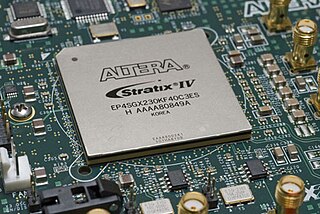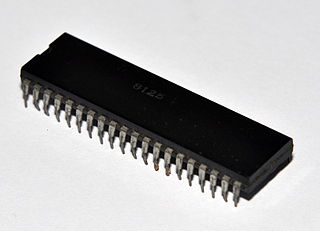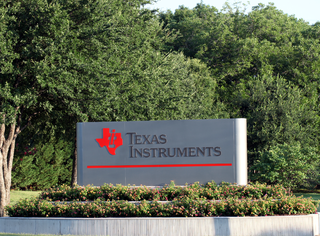Processor design is a subfield of computer science and computer engineering (fabrication) that deals with creating a processor, a key component of computer hardware.

A field-programmable gate array (FPGA) is a type of integrated circuit that can be programmed or reprogrammed after manufacturing. It consists of an array of programmable logic block and interconnects that can be configured to perform various digital functions. FPGAs are commonly used in applications where flexibility, speed, and parallel processing capabilities are required, such as in telecommunications, automotive, aerospace, and industrial sectors.
National Semiconductor was an American semiconductor manufacturer which specialized in analog devices and subsystems, formerly with headquarters in Santa Clara, California. The company produced power management integrated circuits, display drivers, audio and operational amplifiers, communication interface products and data conversion solutions. National's key markets included wireless handsets, displays and a variety of broad electronics markets, including medical, automotive, industrial and test and measurement applications.

An application-specific integrated circuit is an integrated circuit (IC) chip customized for a particular use, rather than intended for general-purpose use, such as a chip designed to run in a digital voice recorder or a high-efficiency video codec. Application-specific standard product chips are intermediate between ASICs and industry standard integrated circuits like the 7400 series or the 4000 series. ASIC chips are typically fabricated using metal–oxide–semiconductor (MOS) technology, as MOS integrated circuit chips.
OpenRISC is a project to develop a series of open-source hardware based central processing units (CPUs) on established reduced instruction set computer (RISC) principles. It includes an instruction set architecture (ISA) using an open-source license. It is the original flagship project of the OpenCores community.
Zarlink Semiconductor was a fabless semiconductor company specializing in the design and manufacture of communication and medical semiconductor integrated circuits, modules, and other devices. In 2011, Microsemi acquired Zarlink in a hostile takeover and merged it into its own operations.

Altera Corporation was a manufacturer of programmable logic devices (PLDs) headquartered in San Jose, California. It was founded in 1983 and acquired by Intel in 2015.

A gate array is an approach to the design and manufacture of application-specific integrated circuits (ASICs) using a prefabricated chip with components that are later interconnected into logic devices according to custom order by adding metal interconnect layers in the factory. It was popular during the upheaval in the semiconductor industry in the 1980s, and its usage declined by the end of the 1990s.

Flex Ltd. is an American headquartered multinational diversified manufacturing company. It is the third largest global electronics manufacturing services (EMS), original design manufacturer (ODM) company by revenue, behind only Pegatron for what concerns original equipment manufacturers. Flex's U.S. corporate headquarters are located in Austin, Texas. The company has manufacturing operations in over 30 countries, totaling about 172,000 employees.
Teradyne, Inc., is an American automatic test equipment (ATE) designer and manufacturer based in North Reading, Massachusetts. Teradyne's high-profile customers include Samsung, Qualcomm, Intel, Analog Devices, Texas Instruments and IBM.

A mixed-signal integrated circuit is any integrated circuit that has both analog circuits and digital circuits on a single semiconductor die. Their usage has grown dramatically with the increased use of cell phones, telecommunications, portable electronics, and automobiles with electronics and digital sensors.

SK hynix Inc. is a South Korean supplier of dynamic random-access memory (DRAM) chips and flash memory chips. Hynix is the world's second-largest memory chipmaker and the world's third-largest semiconductor company. Founded as Hyundai Electronic Industrial Co., Ltd. in 1983 and known as Hyundai Electronics, the company has manufacturing sites in Korea, the United States, mainland China and Taiwan. In 2012, when SK Telecom became its major shareholder, Hynix merged with SK Group.
Electronics Manufacturing Services (EMS) is a term used for companies that design, manufacture, test, distribute, and provide return/repair services for electronic components and assemblies for original equipment manufacturers (OEMs). The concept is also referred to as Electronics Contract Manufacturing (ECM).
Actel Corporation was an American manufacturer of nonvolatile, low-power field-programmable gate arrays (FPGAs), mixed-signal FPGAs, and programmable logic solutions. It had its headquarters in Mountain View, California, with offices worldwide. In November 2010, Microsemi acquired Actel for $430 million.
OmniVision Technologies Inc. is an American subsidiary of Chinese semiconductor device and mixed-signal integrated circuit design house Will Semiconductor. The company designs and develops digital imaging products for use in mobile phones, laptops, netbooks and webcams, security and surveillance cameras, entertainment, automotive and medical imaging systems. Headquartered in Santa Clara, California, OmniVision Technologies has offices in the US, Western Europe and Asia.

Datacube Inc. (1978–2005) was an image processing company that developed real-time hardware and software products for the industrial, medical, military and scientific markets. And the datacube enables data to be modeled and viewed in multiple dimensions.
Microsemi Corporation was an Aliso Viejo, California-based provider of semiconductor and system solutions for aerospace & defense, communications, data center and industrial markets.

LSI Logic Corporation, an American company founded in Santa Clara, California, was a pioneer in the ASIC and EDA industries. It evolved over time to design and sell semiconductors and software that accelerated storage and networking in data centers, mobile networks and client computing.
A field-programmable object array (FPOA) is a class of programmable logic devices designed to be modified or programmed after manufacturing. They are designed to bridge the gap between ASIC and FPGA. They contain a grid of programmable silicon objects. Arrix range of FPOA contained three types of silicon objects: arithmetic logic units (ALUs), register files (RFs) and multiply-and-accumulate units (MACs). Both the objects and interconnects are programmable.










